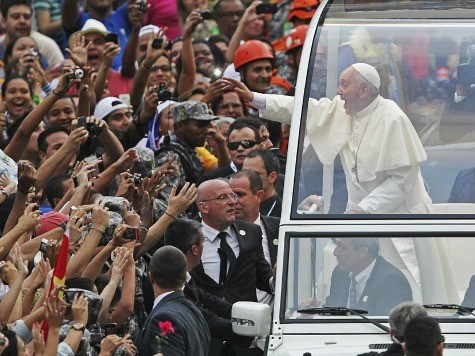In a far-ranging 50,000 word statement released by Pope Francis on Tuesday, he illustrated that he is sympathetic to the tenets of liberation theology and hostile to capitalism.
Liberation theology, which is a recent movement that essentially began at the second Latin American Bishops’ Conference in Colombia in 1968, believes that social systems that contribute to the economic state of the poor should be overthrown. At that conference, the teachings of Jesus Christ were combined with those of Karl Marx to call for violent revolution to overthrow capitalism. The text that emerged that was later used as inspiration was A Theology of Liberation, written in 1971, by Gustavo Gutiérrez, a Peruvian priest and theologian.
In September 2013, Pope Francis held a meeting with Gutiérrez, and L’Osservatore Romano, the Vatican’s semi-official newspaper, published an essay describing it on Sept. 3. The essay asserted that because Francis is the first pope from Latin America, liberation theology can no longer “remain in the shadows to which it has been relegated for some years, at least in Europe.” Michael Lee, associate professor of theology at Fordham University in New York, said that the experience Francis had hailing from South America “is present in the person of Francis and in the Vatican now in a way that it never has been before. What only makes sense is, then, a reopening of the door to this theology that emerged from that context and spoke so powerfully to it, and continues to do so.”
Before the advent of liberation theology, Catholicism hated socialism and communism, regarding them as “godless.” Pope Leo XIII (1878-1903) wrote an entire encyclical condemning socialism.
But now Pope Francis seems to be embracing a condemnation of capitalism instead, and an embracing of socialistic principles. Here are some statements from his text on Tuesday:
Today everything comes under the laws of competition and the survival of the fittest, where the powerful feed upon the powerless. As a consequence, masses of people find themselves excluded and marginalized:
… some people continue to defend trickle-down theories which assume that economic growth, encouraged by a free market, will inevitably succeed in bringing about greater justice and inclusiveness in the world. This opinion, which has never been confirmed by the facts, expresses a crude and naïve trust in the goodness of those wielding economic power and in the sacralized workings of the prevailing economic system.
One cause of this situation is found in our relationship with money, since we calmly accept its dominion over ourselves and our societies. The current financial crisis can make us overlook the fact that it originated in a profound human crisis: the denial of the primacy of the human person!
While the earnings of a minority are growing exponentially, so too is the gap separating the majority from the prosperity enjoyed by those happy few. This imbalance is the result of ideologies which defend the absolute autonomy of the marketplace and financial speculation. Consequently, they reject the right of states, charged with vigilance for the common good, to exercise any form of control. A new tyranny is thus born…
So Francis believes that capitalism, which defends the right to a free market system, is to be discarded, while the right of states, “charged with vigilance for the common good,” to exercise control over the economic status of the people, is laudable. Lenin would not be disappointed.

COMMENTS
Please let us know if you're having issues with commenting.